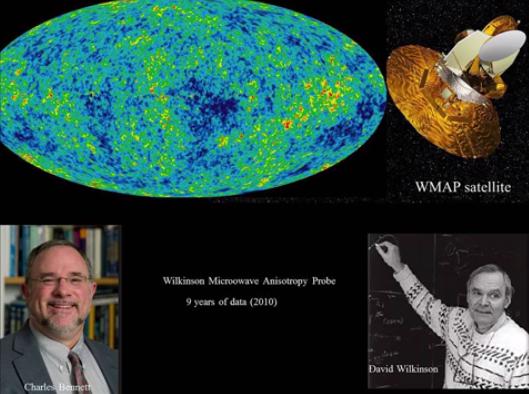The Big Questions in the Universe
An investigation of some aspects of astronomy and cosmology which will offer a number of new insights into many of the most fundamental questions of our Universe.
Gresham Professor of Astronomy, Joseph Silk FRS, is one of the world's leading experts in theoretical cosmology, dark matter, galaxy formation and cosmic microwave background.
(from gresham.ac.uk)
 |
01. The Primordial Fireball
The universe underwent an inflationary period of expansion. From an extremely hot beginning, it cooled down then reheated to form the expanding universe that we observe today.
02. The First Stars
What is a star? What is a galaxy? All revolves around knowing their masses. Why should a star like the sun weigh in at two billion trillion trillion tonnes?
03. Galactic Archaeology
The history of our galaxy will be addressed by a local approach that is in essence the search for fossils. To probe back in time, one can look in our vicinity for the oldest stars.
04. The Formation of Our Galaxy
A typical galaxy, like our Milky Way, has one hundred billion solar masses in stars. It is remarkable that one can do back-of-the-envelope estimates that lead to predictions of the characteristic mass of a galaxy.
05. How Common is Life in the Universe?
The discovery of exoplanets and of Earth twins will be described, with a review of attempts to estimate the probability of finding life in the universe - for example how many stars do we need to survey to find suitable planets?
06. The Dark Side of the Universe
Dark matter dominates the contents of the universe. The Milky Way is full of dark matter. Is dark matter an as yet undiscovered particle?
07. Black Holes
Supermassive black holes lurk in the very centres of galaxies. The Milky Way has a central black hole of four million solar masses.
08. The Expanding Universe
It was once inconceivable that the universe could be expanding. The static universe survived three thousand years of analysis and observation, to become enshrined as a cosmological solution to the equations of Einstein's theory of general relativity.
09. The First Three Minutes of Creation
The essence of life as we know it was produced in the first three minutes after the beginning of the universe.
10. Should We Trust a Theory?
Can a scientific theory ever be confirmed? Must a scientific theory be falsifiable? These are deep questions that have fascinated philosophers from David Hume to Karl Popper, and continue to be at the core of scientific reasoning.
11. The Accelerating Universe
The universe was static, that was the credo of all scientists and philosophers until three decades into the twentieth century, when the expansion was discovered.
12. Observing the Dark Ages
Long before there were stars, there was the stuff that stars are made of. This era of the universe is called the dark ages, when the universe was transparent before the galaxies formed.
| Related Links |
| Stephen Hawking's Universe This is an astronomical documentary series, presented by Stephen Hawking, discussing the history of astronomy, origins of the universe, dark matter and black holes. |
| Space Space (Hyperspace in the United States) is a BBC documentary series, hosted and narrated by Sam Neill, about a study of the Universe. |
| Cosmos: A Spacetime Odyssey This is a documentary series hosted by Neil deGrasse Tyson, exploring how we discovered the laws of nature and found our coordinates in space and time. |
| Cosmic Concepts A look at how concepts developed in physics and cosmology have led to some of our most surprising discoveries about the Universe. |
| Cosmology During this course, you'll have the opportunity to study the cosmos from the modern perspective - what we know and what we're not sure about. |
| Survey of Astronomy We'll explore the Sun, the planets, the many other objects found in the Solar System, stars and galaxies, dark matter, dark energy, the fate of the universe, and the possibility of extraterrestrial life. |